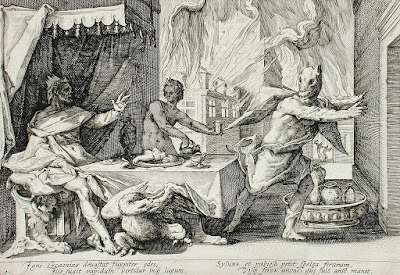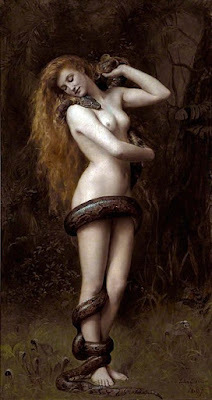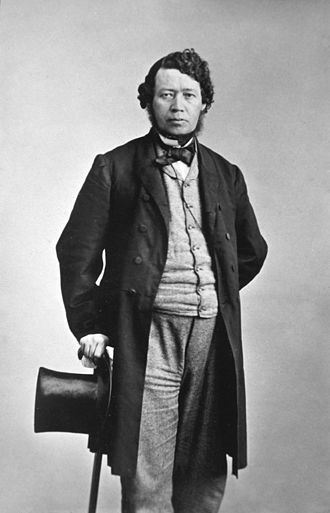Stephen Roney's Blog, page 100
January 19, 2023
The Undead
 Werewolf: Cronach the Elder
Werewolf: Cronach the ElderWe generally tell ourselves that nobody is beyond redemption until the point of death. It seems uncharitable to suppose otherwise. But is this clearly true?
In 1 John, the evangelist tells us there is no point in praying for someone who has committed a truly grave sin.
When the scribes and Pharisees appear at the Jordan for repentance, John the Baptist rejects them.
In the story of the rich man and Lazarus, Abraham says evangelization of the rich man’s relatives is useless: not even a miracle can make them repent.
And Jesus advises us not to cast our pearls before swine.
That actually sounds pretty cut and dried: some people are apparently beyond redemption.
Further evidence is a folk image found all around the world: of soulless beings in human form. The most familiar modern expression is the zombie—and it seems significant that we find the image so compelling. It speaks to something in our experience; we have all met zombies, NPCs. They are being played by some demon vice. The parasitic demon or idolatry has supplanted altogether their soul.
Vampires are a variation on the theme. Like zombies, they have no soul, and survive by draining others of life energy. That is how some people are. Like zombies, they are “undead.” In other words, they are still animate, but the soul has departed. It is perhaps already in hell.
Similar figures are the werewolf, the rakshasa in India, the wendigo among the Algonquins Indians, the Nephilim in the Bible, the witches and ogres and sirens and lamia and melusines of European fairy and folk legend. It is arbitrary to see them as distinct beings; they are different takes on the same being. They are spiritual portraits of people who have surrendered their souls to vice. Modern psychology calls them narcissists.
 Lycaon transformed into a wolf.
Lycaon transformed into a wolf.Lycaon, a figure in Greek legend, seems to have been the first werewolf. He was transformed into a wolf because he served u his own son as a meal—the wolf form was the outward expression of his true bestial nature. He had a beast’s soul.
“Ever since the time of Lykaon a man has changed into a wolf at the sacrifice to Zeus Lykaios, but that the change is not for life; if, when he is a wolf, he abstains from human flesh, after nine years he becomes a man again, but if he tastes human flesh he remains a beast for ever.”
On the mountain on which Lykaon killed his son, it is said, no man casts a shadow.
The rakshasa likes to kidnap and devour children. She can at will appear as a beautiful woman. She is driven by lust, gluttony, envy and anger, without restraint.
 Lilith
LilithShe closely resembles Lilith, the female demon of Judaism and the ancient Middle East. She was the first wife of Adam—so she must take human form. Unlike Eve, however, she is still around, devouring children—so undead.0
The wendigo lives in the forest and devours any human he encounters. He generally appears as human, but his spirit is that of a beast. He is a shape-shifter. “The wendigo is said to invoke feelings of insatiable greed/hunger, the desire to cannibalize other humans, and the propensity to commit murder in those that fall under its influence.”(Brightman, Robert A. 1988. "The Windigo in the Material World.)
The Nephilim are supposedly a human tribe.
“The Nephilim were in the earth in those days, and also after that, when the sons of God came in unto the daughters of men, and they bore children to them; the same were the mighty men that were of old, the men of renown.” – Genesis 6:1
“And there we saw the Nephilim, the sons of Anak, who come of the Nephilim; and we were in our own sight as grasshoppers, and so we were in their sight.” – Numbers 32
From these passages, the Nephilim are taken to be gigantic in stature. But perhaps this refers not to their physical size, but their self-image and boastful nature—their narcissism.
They were apparently prone to unbridled lust. “They married whomever they chose.” And they are the reason Yahweh sent the Flood to purify the world. He considered them beyond salvation.
Ogres are sometimes also thought of as giants; yet they are also able to make themselves small, and pass as ordinary people.
"I have been moreover informed," said the Cat, "but I know not how to believe it, that you have also the power to take on you the shape of the smallest animals; for example, to change yourself into a rat or a mouse; but I must own to you, I take this to be impossible."
"Impossible?" cried the Ogre, "you shall see that presently," and at the same time changed into a mouse, and began to run about the floor. (Perrault, Puss in Boots).
Despite the affection which he [the prince] bore her, he was afraid of his mother, for she came of a race of ogres, and the king had only married her for her wealth.
It was whispered at the court that she had ogrish instincts, and that when little children were near her she had the greatest difficulty in the world to keep herself from pouncing on them. (Perrault, Sleeping Beauty)
So again, the large size perhaps refers to their self-image. They too eat children, and male ogres rape women.
Sirens, mermaids, or lorelei may or may not be driven by lust; but they lure with lust. They are apparently driven by a desire to devour; as are lamia and melusines. They lure unwary suitors to their death. This resembles the “love bombing” familiar to those who have dealt with narcissistic romantic partners.
There are features common to most or all of these imaginary creatures.
They fear the light, and crave darkness. In other words, they hate the truth. Vampires are killed by sunlight. In the original zombie classic, “Day of the Dead,” the zombie assault actually takes place over one night. And the zombies fear fire—light. Werewolves transform and do their deeds at night, under the moon. Sirens and melusines hide their fishlike nature under the water line, emerge from the unknown depths, and will flee if their nakedness is uncovered—if they are seen in the bath.

Narcissists are enemies of the truth—it requires systematic self-delusion to submit to vice. One is hiding from conscience. This is why they attack anyone spreading pearls.
Light has come into the world, but people loved darkness instead of light because their deeds were evil. Everyone who does evil hates the light, and will not come into the light for fear that their deeds will be exposed. (John 3:19-20)
These various revenants are often suave or charming or superficially attractive. The female rakshasa, or the Melusine, lamia, or siren, generally can make themselves appear beautiful. The vampire is courtly, well-mannered.
Lacking conscience or ethics, narcissists are commonly charming in this way. They can say whatever is to their advantage; so they become skilled at manipulation. In other words, they are shape-shifters.
Several of them have the power to infect their victims with their vice: vampires and zombies do. Those who do not, directly and literally, often lure their victims by appealing to a vice: the lamia, the siren, the rakshasa. This is indeed true of the narcissist: he or she badly wants to lure others into vice. Moral behaviour in their presence is a threat to their conscience.
Many of these monsters seem to target children and the young. That is apt for narcissists too. It is not just that children are the most vulnerable victims; they are objectionable to the narcissist for their innocence and sincerity; as well as for the nagging thought that they might outlive the narcissist. Those they cannot tempt into vice they will persecute.
And so, while popular focus currently is on narcissistic love partners, the greater danger is the narcissistic parent.
There are zombies among us.
'Od's Blog: Catholic comments on the passing parade.A Kiwi Sprouts Wings

Jacinda Ardern is stepping down within a couple of weeks.
I did not see this coming. I had just done a personal list of autocratic leaders I thought might fall in the current year. She was not on it.
Xi, Putin, Biden, Trudeau, Sunak, Khameini, Pope Francis, Kamala Harris, Gavin Newsom, Hafez Assad.
She deserved a spot for autocracy, but I did not think she was in danger.
She broke up during her resignation speech. That suggests, prima facie, she did not want to go. What pushed her? And she’s leaving surpisingly soon.
I understand she was down in the polls, but not by much. And she had almost a year until the next election.
She said she lacked the energy for another term.
Maybe she lacked the energy to face a firestorm she knows is coming: about the vaccine, about the Covid response, about Chinese influence. Things are starting to come out, and to be noticed, about each of these.
If this was enough to take her down, it may be enough to take down some others as well. Trudeau, Biden.
It may also be that she lacked energy because she had begun to lack conviction. As the positions of the left have become less and less tenable, it is not surprising if some leaders start to doubt the point of what they have been doing. That leads to a lack of energy.
I think change is in the wind. Give ten points for each leader who resigns or is forced out over the next year, from the above list, and start with ten points for Ardern. I expect at least three more to be gone by year end—40 points.
'Od's Blog: Catholic comments on the passing parade.
January 17, 2023
A Few Matters on My Brain
 Dine in? Entree at the zombie cafe
Dine in? Entree at the zombie cafeOur school textbooks generally reinforce a foolish materialism and hedonism. This goes on in the background, in their assumptions, as much as explicitly. One wonders if the indoctrination is intentional, or if the authors just don’t themselves know any better.
A text I’m currently using to tutor high school students includes in passing the example sentence
“Before we continue the discussion that was interrupted yesterday, let me begin by explaining that pain is something that is felt in your brain.”
Pain is something felt in your arm or other body part, or, more accurately, in your mind. One does not have pain receptors in the brain.
The problem is, of course, the confusion of the brain, a lump of meat, with the mind or spirit.
“On hearing the word vacation, most people react positively.”
Webster’s 1913 dictionary, or the Oxford English Dictionary (OED), offer for “positive” a variety of meanings: definite, legislated, existing in reality, greater than zero, optimistic, and so forth. For this reason, the term should be avoided. It is ambiguous. But even then, no traditional meaning of “positive” applies here.
Why this now widespread misuse of the term?
My sense is that it is an effort to obscure or erase the distinction between “desired” and “good.” Either is vaguely glossed with the term “positive.” Confusing moral issues; seeking to deny morality.
We all just do what we want… and that is good.
I’m not positive that is right.
'Od's Blog: Catholic comments on the passing parade.
January 16, 2023
Multicultism

In 1897, Leonard Cohen’s grandfather founded the Jewish Times in Montreal, Canada’s first English-language Jewish-interest newspaper.
“The paper had a clear mandate: to help Canadianize the teeming influx of Yiddish-speaking Jews arriving from Eastern Europe…. Essentially the journal sought to promote the adoption of mainstream non-Jewish social customs that, religious observance aside, would make Jews indistinguishable from their gentile neighbours” (Michael Posner, Leonard Cohen: Untold Stories. The Early Years).

This is the attitude past waves of Canadian immigrants took: the task was integration, Canadianization.
Now imagine if Leonard Cohen’s family, and the rest of Montreal’s Jewish community, had instead embraced the modern cult of multiculturalism, and decided the imperative was instead to cling to their Jewish and European traditions. Imagine Leonard Cohen, Irving Layton, A.M. Klein, Mordecai Richler publishing only in Yiddish, in small-circulation Yiddish-language journals, writing of Ashkenazi ethnic culture and concerns. Or, if writing in English, writing only of Jewish life. Imagine how much poorer Canadian, and indeed world, culture would be. And imagine how much worse this would have been for them. They would not have had a career.
That gives some sense of the harm done by multiculturalism. It is, not to split hairs, pure evil. It is pandemonium. We need the melting pot. We need e pluribus unum.
I am, by family tradition, part Mohawk (“Haudenosaunee”), if mostly Irish. Some of my in-laws and cousins have their Indian cards; although I would never consent to carry one. I am Canadian, and all Canadians are Metis.
Growing up largely in an immigrant area of Montreal, I studied world religions and literatures to the doctoral level. I have spent half my adult life in Asia. My wife is East Asian; my kids are tri-racial. Yet I have no place in a “multicultural” Canada, because I am too multicultural. I do not fit into any convenient, mutually hostile, ethnic ghetto. Canadians have no place in modern Canada. We are discriminated against.
Cultures belong to people, not people to cultures. Cultures have no rights; they are not alive. People have rights. Multiculturalism is a violation of human equality; an insult to human dignity. It promotes hatred of your neighbour, because he is different from you. It is racism. It is corrosive of Canadian society and culture.

It is harmful, most of all, to more recent immigrants. Anyone who has lived in a new culture knows the dangers. Culture shock is the common reaction. The unwise retreat into their own world, fearing and hating those around them. Their daily lives become hellish; nothing around them makes sense. Some literally go mad. Others become aggressively antisocial.
The cure, as old hands always tell the newcomers, is to get out and engage with the culture. Learn how things work here.
Multiculturalism thus encourages exactly the wrong attitude and the worst behaviour.
Life in a ghetto, which it demands, also limits economic opportunities. Ask Martin Luther King; such segregation is what he fought so hard against. It is why Canadian First Nations are so poor—that is, those who have stayed on the reserves. Why did we decide apartheid and segregation was a good idea?
Multiculturalism also condemns the immigrant to live his life in exile. Home is forever far away, in the land he left; Canada remains forever foreign. Our patriotic task as Canadians, and what we owe our neighbours, is to build a sense of common home here, in this land, among these people.
Culture is a series of tools, strategies and knowledges, if you will allow the plural, for a good life. As with any other technology, it ought to evolve and improve over time. If it does not, it is failing; it is dying. It needs to be abandoned for a better tool. Only a fool sticks with a poor tool simply because it is the one he is familiar with.
As an immigrant nation, Canada has the perfect opportunity to assimilate the best elements of all the world’s cultures. This should make Canadian culture the strongest and best the world has ever known. That is what the Canadian “mainstream” is, and what it has always done.
To encourage us instead to stick with a horse and buggy, because our ancestors drove one, is spectacularly stupid. Or intentionally malicious.
'Od's Blog: Catholic comments on the passing parade.
January 15, 2023
How About a Mass in Pig Latin?
 Uneasy lies the head ...
Uneasy lies the head ...There are rumblings of a coup in the Vatican.
That is surprising. There seems to be no legal means for unseating a pope.
Nevertheless, discontent with Pope Francis has become quite open. Cardinal Pell, widely respected, has been revealed as author of a letter some months ago describing Francis’s pontificate as catastrophic for the church. Rumours are flooding in of a group of cardinals planning to oust him. Word is that Francis is isolated and has no friends in the curia, largely due to his penchant for individual and autocratic rule.
The flash point seems to be an also-rumoured upcoming crackdown by Francis on the Latin mass.
I am no special fan of the Latin mass. To me the mass is the mass, either way. But it also makes no sense to prohibit it. We allow masses in every other conceivable language—except Latin? How is that sensible, or doctrinally important? How is that the hill for Francis to die on? Especially since insistence on the vernacular mass has already caused one split in the church, the Society of St. Pius IX.
As it happens, having gone through various religion departments for my own education, I have some idea. Or my friend Xerxes, nominally a pillar of the United Church; he shows the same tendency. Among the ministerial elite of mainstream denominations, there is a sort of competition to see who can be most theologically transgressive. The great opponent becomes, not unbelief or immorality, but those who take traditional teachings too seriously.
Xerxes writes frequent columns against Biblical literalism; against those who have clear ideas about God; or who advocate conventional morality. He rarely rails against the ways of the world, only calling vaguely and blandly for peace, voting NDP, and giving to the poor.
A professor at Syracuse suggested in passing that an atheist would and should feel comfortable in the religion department. A major religious publisher considering my manuscript wanted to be sure that it was fully welcoming to atheists. The paper that attracted the most interest and admiration at a departmental conference was titled “So Meaning is Your Hangup?” Open rumour was that the author was in an adulterous relationship with her thesis advisor. “Rumour,” in that small department, is perhaps not the correct word.
This is what Pharisaism looks like. The problem with religion is that it imposes obligations on you, in matters of belief and conduct. If you are in the power elite, you don’t like to be constrained by anything. So once you rise to ministry, your chief opponent becomes the actual teaching you are charged with spreading.
Some, like Cardinal McCarrick or Jimmy Swaggert, will simply continue to preach what they reject for themselves. These are the classic Pharisees. Some, like Xerxes or Pope Francis, perhaps more honestly, will instead devote their energies to undermining the faith. They will set up public services for Pachamama; they will hold “clown masses.” And they will attack on any premise those who continue to follow the faith: those who annoyingly quote the Bible, those who don’t embrace transgenderism or some other current moral fad, those who “judge,” those who want the Latin mass. Largely because they feel judged by them, and found wanting. How dare they act holier than their minister? Than the Pope? Who do they think they are?
Being Pharisees, they never stop to ask themselves who they, themselves, think they are.
'Od's Blog: Catholic comments on the passing parade.
January 14, 2023
Shut Up! Shut Up! Shut Up!
Pierre Poilievre is in trouble with the mainstream media for giving a speech to the Frontier Centre. Because the Frontier Centre, in turn, has done radio spots claiming, presumably with data, that those who went to Indian Residential Schools graduated knowing more about Indian culture and language than those who did not attend. This counts as “residential school denial,” and no one is allowed to speak to you ever again if you are guilty of it.
Another example of the growing influence of “cancel culture.” There is an ever-growing list of things you cannot say, and people you must not talk to.
You must not talk to truckers if they come to call. You must not say the Covid vaccines are ineffective. You must not mention abortion. You must not mention the Nuremberg protocols. You must not question the series of assertions collectively referred to as “climate change.” You must not call people by their birth name—that’s “deadnaming” them. You must not call them a mn if they assert that they are a woman. The list keeps growing.
The critical thing to realize about such extreme censorship: nobody censors lies. Nobody cares if what you say is untrue. Then they are happy to refute it. Nobody cares if you say the Earth is flat, or that the sun goes around the Earth, or that the Chinese discovered America. Only truth needs to be censored, precisely because it cannot be refuted, and people will believe it if they are exposed to it. The more agitated and extreme the censorship, the more certain you can be that whatever is being silenced is true. This is the golden rule.
As for the Indian Residential Schools specifically, it should stand to reason that an education is an education: one graduates with more knowledge, not less. Even if a school wanted, as is claimed of the residential schools, to actually suppress what you know of your own culture, it would seem to be a nearly impossible task. Memories are durable. You do not forget your first language by learning another—indeed, Latin and other languages have traditionally been taught on the premise that they help you understand English better.
Moreover, if your intention was to teach Indian students only the mainstream culture, and integrate them into the mainstream, why would you send students to a segregated Indian school, instead of integrating them into the public system? In fact, the residential schools were designed to preserve Indian culture.
Pretty much everything we are told about the Indian residential schools is a lie; which is why any defense of them must be suppressed. There are too many people with vested interests in the lie.
“Deadnaming,” “misgendering,” and “preferred pronouns” are a comparable example. If, by contrast, you happened to mistake the sex of a real woman, or call her by the wrong name, she would probably simply correct you.
It is all denial.
We see something similar with the rash of statue-toppling and public renamings of buildings. It is always the good guys whose statues go down. Nobody is upset if you honour a villain. Egerton Ryerson, who founded the public school system in Ontario, and did his best to advance the interests of the native people, must have his statue removed and his name effaced from the university which, in a sense, he founded. Meantime, across town, nobody comments on the name of George Brown College—although George Brown has no connection to the institution, and was prejudiced against the French, the Catholics, and opposed any formal recognition of native land rights. Sir John A. Macdonald, who fought him over this in defense of the native people, and wanted their enfranchisement as full citizens, gets his statues torn down, supposedly for his treatment of the native people. Despite his great accomplishment, Canada itself. Meanwhile, nobody calls for the removal of the public statues of Louis Riel, guilty of treason, wanting to split the West from Canada and sell it to the States, not to mention murder. Even though, oddly, all the statues of Confederate figures in the US are being torn down on the premise that they were guilty of treason. Yet they, unlike Riel, were never convicted of it, and could not have been—since they were loyal to their states, and the American states were then considered sovereign.
Henry Dundas’s name is similarly being erased from downtown Toronto, supposedly because he supported slavery--although he was a leading figure in the abolition movement. He should have kept his mouth shut and gone along with it, I suppose.
Meanwhile, nobody calls for pulling down the public statues of the Famous Five, in Calgary and Ottawa, and the many other memorials. Although they promoted eugenics and forcible sterilization, and opposed non-white immigration.
And nobody objects to the several public statues of Norman Bethune. Granted, he did some humanitarian work in Spain and China. But why him in particular? Canadians are apparently entirely unaware that he was just one of many medical missionaries Canada sent to the Far East in the nineteenth and early twentieth centuries. Many of them, like Bethune, died there. Many stayed longer, and made greater humanitarian contributions. Many are commemorated in those lands: Scofield, Avison, Hall, et al. Avison even has a memorial in Toronto—donated by Koreans. Yet only Bethune gets honoured here, by Canadians, and by our government.
Bethune was a confirmed Stalinist who worked to put Mao Zedong in power; these are perhaps the two worst mass murderers who ever lived. The others went for Canadian church groups.
That’s the only obvious difference between him and these other missionaries; so apparently that is why he gets honoured, and they don’t.
When did we start shouting people down? When did we turn away from truth?
If I had to pick a date, perhaps the day Henry Morgentaler was given the Order of Canada for breaking Canadian law to abort children, an activity from which he profited personally.
I suspect it all goes back to abortion, and our collective guilt over it. That is when it first became important to shut up.
'Od's Blog: Catholic comments on the passing parade.
January 13, 2023
The Way We Were

This cover from 1971 shows us how far the arts and letters have fallen since the 1960s. Look who was writing then. And in the popular press!
Why Politics Still Matters
 To be remembered, now and in days to come, wherever the maple leaf is flown.
To be remembered, now and in days to come, wherever the maple leaf is flown.Politics is downstream from culture; and culture is downstream from religion. This political world is in the hands of the Devil. So should we really care too much about politics? Does it even make a difference?
It does. Not usually. Usually, politics is just about reading the polls and running to the front of the parade. But when there is an exception, it is magnificent, and worth attention even as art. For a current example, Ukraine might not have held out against Russia in the early days of the war had Zelensky not been in charge. Another leader might have taken the offer from America of a quick flight to safety. Zelensky went before the cameras instead, and said “I need ammunition, not a ride.” That alone is worth a statue in every town square. He has been similarly eloquent since in scaring up material support from the West.
And the results of his speeches are likely to be profound for the future lives of citizens of Ukraine, of Russia, and quite possibly of China, Taiwan, Iran, and the rest of the world. The right man with the right words at the right time.
Churchill is a similar example. His speeches and his resolve during the Second World War held things together when another leader might have sought terms with Germany after Dunkirk. As Chamberlain did, and the French. Then where would we all be?
From these examples, we see that good politics is actually a form of art: rhetoric. Both Churchill and Zelensky are in fact certifiably artists, quite apart from politics. Churchill won the Nobel Prize for Literature. Zelensky was a popular television comic.
The military apparently knows this. A friend went through the American Air Force Academy’s officer training. He says the main emphasis was on giving a speech.
One can say that it is art, and not politics, that makes a difference. But then one must note that the best politics is itself art. One can miss a Ralph Klein, or a John Diefenbaker, or a Boris Johnson, just for the fun of watching them perform, quite apart from their policies.
Two things are necessary for good politics, rare as it is, and they are the same two things necessary for art: skill at communication, and principle. Or, put another way, something important to say, and the ability to say it well. This is the difference between art and mere craftsmanship. Or between being an artist and being a madman.
Pierre Poilievre excites me on the Canadian scene currently, because he has exceptional rhetorical skill. You can see it especially in his postings to social media. He may not hold to principle; but so far the prognosis looks good. The contrast with Erin O’Toole is dramatic. O’Toole seemed to have no principles, and then did not speak well. He was bad enough to be offensive, to insult one’s intelligence for having taken the time to listen. Andrew Scheer might have had principles, but who can tell? He was inarticulate when asked to express them.
Donald Trump in the US, and Boris Johnson in the UK, are interesting and tragic studies of just falling short. Both have immense rhetorical skills. This gave them great promise. Trump is given too little credit for his artistic talents. He can speak extempore for two hours, and hold an audience enthralled. His short epithets for opponents are, in their way, poetry.
Yet both fail on lacking clear principles, lacking a vision; making them mere craftsmen. Boris was great until Brexit was accomplished, and then floundered. He was all dressed up, with no idea of where to go. Trump was great at expressing the themes of “America First” and “drain the swamp,” yet he seems to have been ineffective at draining it; while his choice of foreign policy advisors seemed inconsistent. This may have been because of internal opposition; but I don’t buy it. The problem was that his true love was the art of making a deal. As part of this deal-making process, he would talk a hard and principled line, then compromise. The initial principle mattered less than getting the deal. Good business, but not good politics; because uninspiring. It leaves the impression of moral chaos.
A similar tragic failure is John Diefenbaker. He was wonderful to listen to, always entertaining, often compelling, often right, but he quickly came to exude the same sense of chaos as Trump and Johnson do. He was a heavy cannon, but a loose one. He managed the Canadian Bill of Rights, and then was not sure what to do.
Adolph Hitler and Benito Mussolini were also artists, and this was probably the source of their success. They knew how to communicate. Hitler’s speechifying was famous. But they were also lousy artists; and not just, like Johnson or Diefenbaker, because they lacked principles; although they did. William L. Shirer, who was there, noted that Hitler would say completely different things with equal conviction depending on his audience. For Mussolini, Fascism was mostly whatever the moment seemed to require. They were also bad at art, in the sense of relying on cliché and cheap thrills. As a visual artist, Hitler’s drawings were always cliched scenes, of the sort you might once have bought in a Woolworth’s painted on felt. Not good enough, famously, to get him into the Vienna Art Academy. Mussolini wrote short stories; but they are dime novel stuff, relying heavily on cheap thrills and lurid descriptions of violence. They were the sort of artists who do often achieve mass appeal with emotional junk: the drawers of paintings of kittens with big eyes and the writers of formula romances for Harlequin.
So too with their political rhetoric: full of sound and fury, signifying nothing.
Justin Trudeau is frighteningly cut from the same cloth: an incompetent wannabe actor. And his wife is, interestingly, a wannabe singer of about the same calibre. The class of wannabe artists is crowded with narcissists. The narcissist will naturally want to think of himself and be thought of as an artistic genius. But he will lack the necessary insight or self-knowledge. Indeed, he will be terrified of insight or self-knowledge.
Anothergreat political artist was Ronald Reagan. Reagan, of course, learned his craft as an actor, and a real, successful actor, not a poseur like Trudeau. Granted, he was a better politician than actor. Acting is harder and a higher-level skill than politics. But his skills helped bloodlessly end the Cold War, and ushered in a new golden age for America, after years of apparent decline.
Margaret Thatcher did about the same, at about the same time, for Britain. Again, it was largely due to attention to rhetorical skills as well as to firm principles. She worked hard at rhetoric, learning to lower her voice, for example, to sound more authoritative. She, or her speechwriters, are responsible for a number of lines that are now immortal, like “The lady’s not for turning.”
Acting ability and experience was the secret of John Paul II’s papacy as well. Pope Benedict, the more learned and the better-grounded man, really John Paul’s mentor, lacked this talent, and so sailed into controversy. Which sadly wore him down. Pope Francis, unfortunately, lacks both Benedict’s vision and John Paul’s acting skills.
Thomas D’Arcy McGee in Canada, and Daniel Patrick Moynihan in the US, are other examples of brilliant politicians. Neither rose to the very top of their profession. Yet this, I think, was because both were more interested in doing good than in personal power. Principled men, they would rather have been right, as they say, than president. This seems to be especially an Irish thing. One thinks also of Grattan O’Leary, Bryce Mackasey, Eugene McCarthy, or of W.B. Yeats’s political career.
Although too little credited, and still too little listened to, D'Arcy McGee invented Canada.
Pierre Trudeau was another brilliant politician, in contrast to his son. He himself once remarked that he saw the job primarily as that of an actor. He was magnificent on the principle of federalism and against separatism, although he lost direction once this matter seemed settled. As it happened, separatism was such a dominant issue during his political career that few in Central Canada noticed how erratic and frivolous he was on other topics. Folks out West did.
The mention of Moynihan, McCarthy and Trudeau, officially on the left, perhaps serves only to throw into relief the fact that most of the politicians I cite as great seem to come from the right side of the political spectrum. Is this bias on my part?
I think not. It is the principle thing. Pretty much by definition, to have enduring principles means to be conservative. To be “on the left” means, broadly, to be calling for change, being subject to whatever winds might blow. Anyone who still held sincerely to the beliefs of the left as they were thirty years ago would now be denounced by the left as an extreme right-winger. Ask Elon Musk, or Joe Rogan, or Jordan Peterson, or Ronald Reagan, or Joseph Ratzinger. So leftists might be rhetorically skillful, but almost by definition lack a consistent vision. “Change” is not a vision. It is a kaleidoscope.
And if you lack a consistent vision, it is even hard to be rhetorically compelling. It is not just that people are liable to notice you were saying the opposite until recently. If it is really good, fellow leftists will remember it to condemn you for it a few years later.
This is one reason why, to look for any real change, we must look to the right.
'Od's Blog: Catholic comments on the passing parade.
Breaking News: A Child Died 125 Years Ago
 LeBret Indian Residential School, Saskatchewan
LeBret Indian Residential School, SaskatchewanA human jawbone has been found at the site of the former LeBret Indian Residential School in Saskatchewan. Coroners say it is the jaw of a child 4-6 years old, and he or she died somewhere around 125 years ago.
This is being played as big news in the media, as proof that children were subject to genocide at the residential schools and were buried in mass graves. However, one cannot help but notice that, after loudly and internationally declaring there were mass graves, and after a year and a half of searching since across the Canadian West, this is all the solid evidence anyone has produced. One child’s jawbone.
Was it ever in an unmarked grave? Perhaps the grave marker has been lost. Perhaps the remains were inadvertently exhumed from a marked grave by gophers or ground squirrels or the spring rains.
Did he or she die of unnatural causes? Child mortality 125 years ago was high. “One third of all children born in 1830 [in Canada] did not make it to their fifth birthday. Child mortality remained above 25 percent for the remainder of the nineteenth century, before falling at a much faster rate throughout the 1900s.” (Statista, https://www.statista.com/statistics/1041751/canada-all-time-child-mortality-rate/#:~:text=Child%20mortality%20in%20Canada%2C%201830%2D2020&text=This%20means%20that%20one%20third,faster%20rate%20throughout%20the%201900s.) Tuberculosis was common among native children, in the schools or on the reserves.
Was he or she a student at the school? School starts at six; they didn’t do kindergarten back then. This skeleton is just within possible range. The school sits in a reserve; this might have been any child living on the reserve.
Finally, if this was a student at the school, and there was foul play, murders happen everywhere. Why does this reflect on the school, and not on the government of the reserve?
A child died about 125 years ago. For those who care deeply, there is a more immediate problem. One word. Abortion.
'Od's Blog: Catholic comments on the passing parade.
January 11, 2023
How Many Souls Fit under a Microscope?
I think psychiatry and psychology do enormous harm. “Psyche” is soul. You cannot have a materialist psychology, that does not even believe in the existence of the soul.
That blanket statement includes Jordan Peterson. While I generally agree with his politics, all he has managed to do in his thinking on psychology, in his rules for life and related videos, is to struggle his own way through a corn maze of miseducation to the unlocked front door of the stable. He is perhaps ready to acknowledge the existence of God. That puts him in the position of a baby about to be baptized; not a leader.
More regrettably, psychology suffuses our culture. We treat it like a religion; except that people seem to cling to their preferred psychological theories more fiercely and with less logic or evidence than anyone ever clings to a religion. Marking it as an idolatry, or, in psychological language, a delusion.
A sample text in a current textbook—in English, not Psychology--is all about the problem of bullying. And it explains, as psychology does, that people become bullies because they have themselves been bullied; or because they have been neglected by their parents, and do it to get attention.
One vital thing is immediately missing in this analysis: free will. As we see here, psychology reduces everyone to NPCs—except the psychologist. You stick in this pin, and you get that response.
The tremendous advantage of this viewpoint is that it eliminates right and wrong. With no moral choices, there is no morality. This is a great boon to those who want to do wrong, of course. Accordingly, psychology promotes evil.
That is actually the perfect philosophy to create bullies. It exonerates them. And it makes it unnecessary, indeed impossible, for them to change their behaviour, to improve themselves—because, after all, they have no free will. At the same time, the psychologists see themselves as gods, having agency over their patients when their patients do not—attracting bullies to the profession. And of course being logically inconsistent, and denying the essential moral principle, that of human equality: do unto others.
All this would be utterly damning even if it were true that bullies are tempted (albeit not compelled) to bully because they have themselves been bullied. But this too is improbable. Being bullied is painful. Experiencing pain, does the average person really want to impose it on someone else? If, for example, you put your hand on a hot stove, and get burned, are you motivated to encourage others to put their hands on hot stoves?
For most people, the reverse. Being bullied would convict you not to bully another. You would develop empathy and a fierce sense of justice.
And this is just what you find in those who have been abused. Elon Musk is one example. He apparently bought Twitter to end the bullying.
Why do psychologists believe the opposite?
First, because they simply ask bullies why they bully, and accept the answer. No bully is going to voluntarily take the blame. The obvious dodge is to insist they are actually the victim.
And, being bullies themselves, the psychologists embrace the explanation.
As for bullying coming from a lack of attention from parents, this is nonsensical, because as a child, in order to get away with bullying, you generally do not want adult witnesses. So it is not what you are going to do if you want attention from your parents. It is the opposite of what you would do.
THis too probably comes from bullies refusing to take responsibility for their actions. So they will shift the blame to their parents: "I wouldn't have been able to do it if they had kept a closer eye on me."
The best approach to psychology is to assume that everything it says will be the opposite of the truth.
I think we all secretly know this. It is more or less the basic principle Freud propounded, when he claimed that everything our subconscious says to us means its opposite. He was actually revealing that tendency in himself.
'Od's Blog: Catholic comments on the passing parade.



